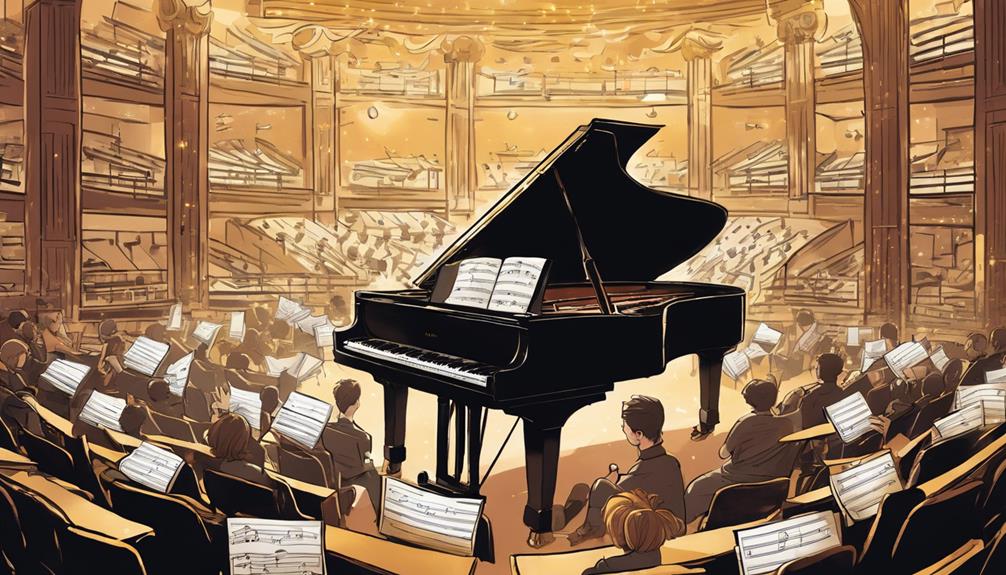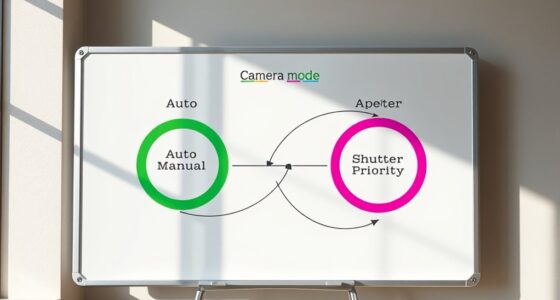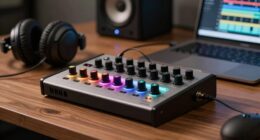To gain acceptance into a top music school, you'll need to showcase exceptional musical talent, a unique personality, and a well-rounded application. Focus on honing your instrument skills, preparing for auditions, and building confidence in your abilities. A strong academic record is also essential, but it's not the only factor. Create a diverse repertoire that highlights your strengths and musical personality. Incorporate lesser-known pieces to stand out from the competition. By demonstrating your passion, dedication, and artistry, you'll increase your chances of getting accepted. Now, take the next step to discover the secrets to a successful music school application.
Key Takeaways
- Focus on developing your unique musical personality, instrument skills, and musical abilities to stand out in auditions.
- Showcase authenticity, passion, and dedication through your performances, and highlight your strengths and talents effectively.
- Prepare for auditions by mastering your instrument, musical literacy, and performance skills, and utilize resources like masterclasses and workshops.
- Build a well-rounded application by curating a diverse repertoire that showcases your versatility, unique artistic voice, and musical range.
- Boost your confidence by seeking feedback, mastering audition pieces, and embracing your individuality to increase your chances of acceptance.
Developing Your Musical Talent
To increase your chances of getting accepted into music school, focus on developing your musical talent by honing your instrument skills and musical abilities, as this is a key factor in the admission process.
By doing so, you'll be well-prepared to tackle the demands of a music program. Think back to your first lesson – how far have you come? Continue to build on that foundation by practicing regularly and seeking out opportunities to improve.
As you progress, you'll develop a unique musical personality that will set you apart from others. Music schools want students who are dedicated, passionate, and talented, so make sure you're showcasing your skills and abilities in the best possible light.
Showcasing Your Personality

As you prepare for your music school audition, remember that showcasing your personality is just as important as demonstrating your musical talent.
By being your authentic self and sharing your musical story, you can create a lasting impression on the admissions committee.
This means incorporating personal touches and nuances into your performance, allowing your unique personality to shine through and set you apart from other applicants.
Be Your Authentic Self
When you walk into that audition room, remember that it's not just your technical skills that will get you noticed, but your unique personality and style that will set you apart from the crowd.
Being your authentic self is essential in an audition, as it allows you to express your true musical voice and style. Don't try to emulate someone else; instead, go back to what inspired you to pursue music in the first place.
Share your passion and personal connection to the music, and let your genuine enthusiasm shine through.
Authenticity in your performance can leave a lasting impression on admissions committees. They're not just looking for technical proficiency, but for someone who can bring a unique perspective to their program.
By being true to yourself, you'll be able to connect with the audience and evaluators on a deeper level. So, don't be afraid to let your personality shine through in your audition.
Share Your Musical Story
By sharing the personal experiences and stories that have shaped your musical journey, you can showcase your unique personality to admissions committees and leave a lasting impression. This is your chance to stand out from other applicants and demonstrate your passion for music.
When sharing your musical story, be sure to highlight the following aspects:
- Your musical journey, including the challenges you've overcome and the lessons you've learned
- How music has shaped your character and influenced your artistic choices
- Your individuality and what sets you apart from others
- How your personal experiences connect to your musical aspirations
Academic Achievements Matter
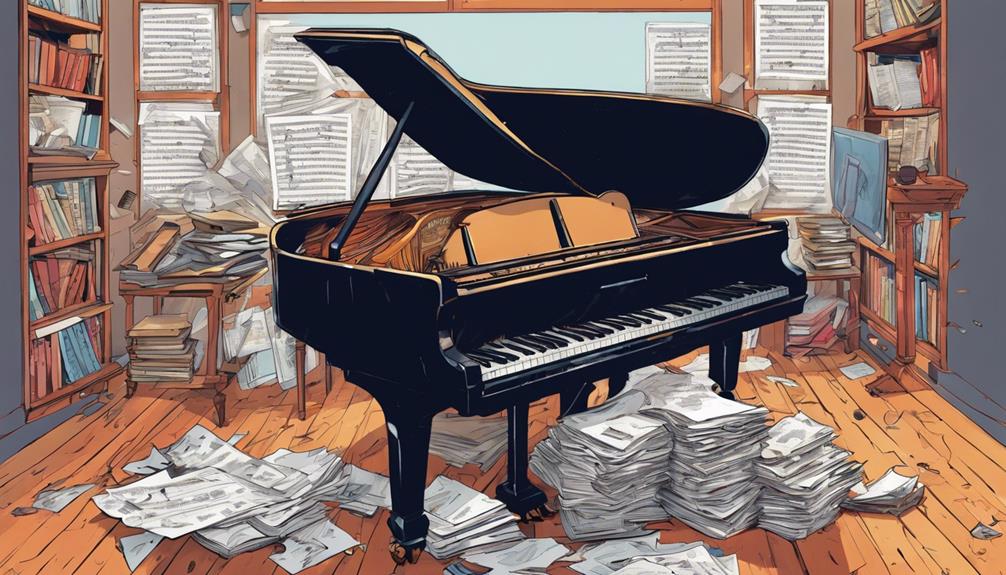
Meeting the necessary grade point average is essential, but it's not the sole determining factor in getting accepted into a music program. While you do need to meet specific grade requirements, music schools prioritize evaluating applicants based on their instrument skills and musical talents. As a performance major, your musical ability is more critical than your academic achievements.
So, don't worry if your high school grades aren't perfect – what matters most is your musical talent and potential.
Music departments look for a balance of musical ability, personality, and grades in potential students. They want to see that you're dedicated, passionate, and skilled in your craft.
Preparing for Auditions
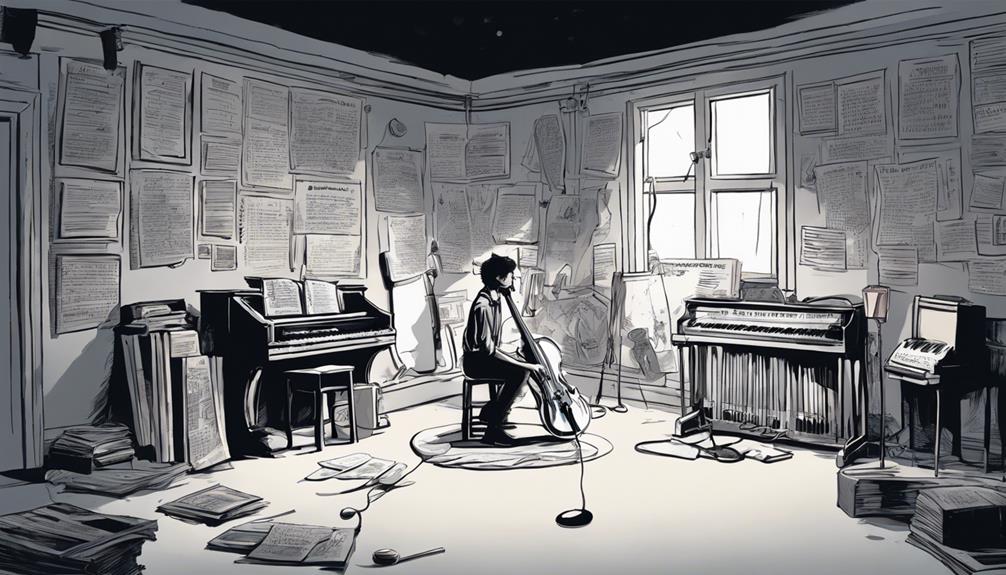
When preparing for music school auditions, it's crucial to focus on mastering your instrument, developing musical literacy, and honing your performance skills. By doing so, you'll be able to showcase your technical proficiency, musical understanding, and stage presence to the audition panel.
Master Your Instrument
To stand out in a crowded field of talented musicians, you must demonstrate exceptional skill and artistry on your instrument, making it essential to dedicate yourself to mastering its intricacies. As you prepare for music school auditions, focus on developing technical proficiency, musical expression, and stage presence. These elements are vital in showcasing your abilities and leaving a lasting impression on the admission committee.
To achieve mastery, practice regularly and seek feedback from teachers and peers. This will help you identify areas for improvement and refine your performance.
Additionally, consider the following strategies to enhance your instrumental skills:
- Prepare a diverse repertoire that showcases your range and versatility on your instrument
- Utilize resources like masterclasses, workshops, and private lessons to gain new insights and techniques
- Focus on developing a strong foundation in music theory and history to inform your performance
- Record yourself playing to identify areas for improvement and track your progress over time
Develop Musical Literacy
Developing musical literacy is essential for acing music school auditions, and it starts with mastering the fundamentals of music theory, sight-reading, and ear training. These skills are the building blocks of musicianship, and having a strong foundation will set you apart from other applicants. Understanding key signatures, time signatures, and musical terms is vital for auditions, as it demonstrates your ability to read and interpret music.
| Musical Literacy Skills | Benefits for Auditions |
|---|---|
| Music Theory | Understand musical structure and composition |
| Sight-Reading | Confidently perform unfamiliar pieces |
| Ear Training | Develop pitch recognition and improvisation skills |
| Understanding Key Signatures and Time Signatures | Accurately interpret musical notation |
Practicing scales, arpeggios, and technical exercises will also improve your overall musicianship. Additionally, studying music history and different musical styles will enhance your interpretive skills, allowing you to bring depth and nuance to your performances. Working with a qualified music teacher can provide tailored guidance for audition preparation, helping you to focus on areas that need improvement. By developing your musical literacy, you'll be well-prepared to showcase your skills and increase your chances of getting accepted into music school.
Hone Performance Skills
Now that you've built a strong foundation in musical literacy, it's crucial to focus on honing your performance skills to ace those auditions. As you prepare for music school, refining your technical skills and musical expression is vital. This will help you stand out from the competition and showcase your abilities to the admissions committee.
To do this, you should:
- Practice diligently to refine technical skills and musical expression for auditions
- Select audition repertoire that showcases your strengths and abilities on your instrument
- Seek feedback and coaching from experienced musicians to improve your performance
- Prepare mentally and physically to deliver a confident and engaging audition
Additionally, recording yourself practicing and performing can help you evaluate and enhance your skills.
Building Confidence
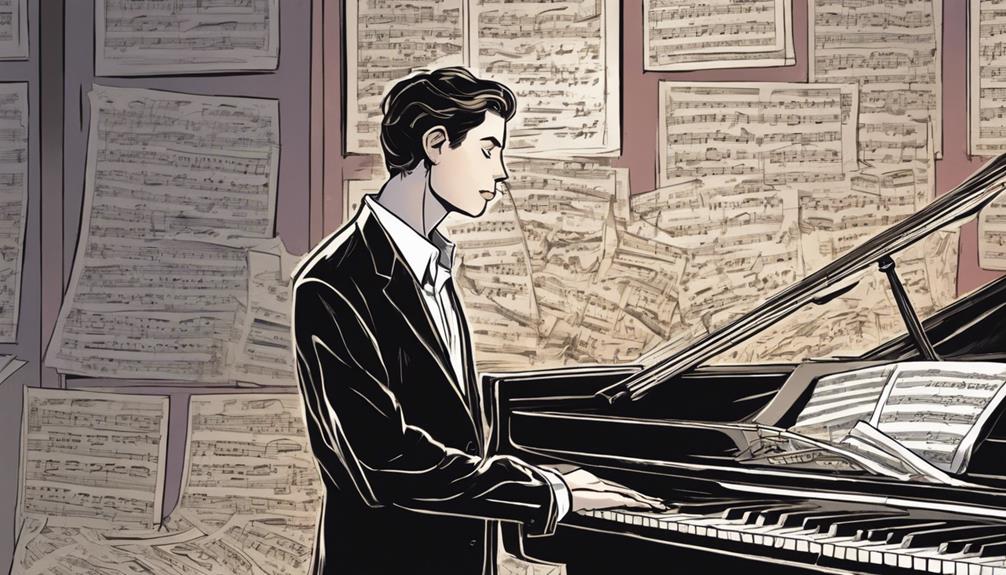
In preparation for music school auditions, cultivating confidence in your abilities is crucial, recognizing that a strong sense of self-assurance can make all the difference between a successful and unsuccessful application. By highlighting your unique strengths and talents, you can showcase your musical abilities and accomplishments, thereby boosting your confidence during auditions. Seeking feedback from teachers and mentors can also help you improve and feel more confident in your abilities.
| Confidence Boosters | Benefits |
|---|---|
| Showcase unique strengths | Stand out from the competition |
| Highlight musical abilities | Boost confidence during auditions |
| Seek feedback from teachers | Improve and feel more confident |
| Master audition pieces | Increase confidence in performance |
| Embrace individuality | Stand out and feel confident in application |
Applying to Multiple Schools

You'll greatly improve your chances of getting accepted into a music school by casting a wider net and applying to multiple programs. This strategy not only increases your chances of acceptance but also provides you with more options to choose from. By auditioning for multiple programs, you'll have a better understanding of what each school has to offer and can make a more informed decision.
Here are some key benefits to take into account:
- Applying to multiple schools increases your chances of acceptance
- You'll have more options to choose from, allowing you to find the best fit for your music career
- You'll gain valuable experience and feedback from multiple auditions
- You'll be able to compare and contrast different programs, helping you make a more informed decision
Creating a Well-Rounded Application

By thoughtfully curating a diverse repertoire, you can create a well-rounded application that showcases your versatility, musical range, and unique artistic voice. Incorporating a mix of familiar and lesser-known pieces, as well as different styles and genres, demonstrates your dedication and passion for music. This will also highlight your strengths and unique musical voice, making your application stand out.
Here's an example of what a diverse repertoire might look like:
| Style/Genre | Piece | Composer |
|---|---|---|
| Classical | Moonlight Sonata | Beethoven |
| Jazz | My Funny Valentine | Chet Baker |
| Musical Theater | Defying Gravity | Stephen Schwartz |
| Contemporary | Electric Counterpoint | Steve Reich |
Highlighting Your Strengths

When getting ready to apply to music school, showcasing your skills through a well-curated repertoire that highlights your musical strengths is crucial. When selecting pieces, it’s important to demonstrate both technical ability and emotional expression to leave a lasting impression on the admissions committee. Additionally, researching audition requirements and seeking guidance from instructors can help you feel more prepared. Understanding how to start music school involves careful planning, dedication to refining your craft, and presenting yourself as a passionate and well-rounded musician.
By selecting pieces that demonstrate your technical proficiency, emotional expression, and unique musical style, you'll create standout performance moments that leave a lasting impression on the admissions committee.
Showcase Your Skills
Selecting the right repertoire is essential to showcasing your skills and highlighting your strengths in music school admissions. It's crucial to choose pieces that not only demonstrate your technical proficiency but also reveal your musical personality. A well-curated repertoire can make a significant difference in your audition, setting you apart from other applicants.
To showcase your skills effectively, consider the following:
- Demonstrate versatility: Include a variety of pieces in your audition to display your musical range and adaptability.
- Stand out with unique choices: Opt for lesser-played compositions that showcase your creativity and originality.
- Highlight your interpretive skills: Choose pieces that allow you to showcase your ability to interpret and convey the composer's intent.
- Reveal your artistic voice: Select pieces that reflect your musical personality and style, giving the admissions committee a sense of who you are as an artist.
Standout Performance Moments
To create a memorable audition, craft standout performance moments that spotlight your unique strengths and talents, setting you apart from the competition. One way to do this is by showcasing a diverse selection of repertoire that highlights your interpretive creativity.
Including lesser-played compositions in your performance will demonstrate your musical range and versatility, making you a more attractive candidate. By incorporating a variety of musical styles in your repertoire, you'll emphasize your unique talents and skills, setting you apart from other applicants.
Create a well-rounded and distinctive recital program that showcases your strengths as a musician, making a lasting impression on the audition panel. Avoid playing it safe by sticking to overplayed pieces; instead, take risks and present lesser-known works that showcase your artistic vision.
Unique Musical Style
By selecting repertoire that highlights your strengths and abilities, you can showcase a unique musical style that sets you apart from other applicants. This is important in getting accepted to music school, as it demonstrates your individuality and creativity.
To stand out, you should incorporate lesser-played compositions into your audition repertoire, making a lasting impression on the admission committee.
Here are some tips to help you showcase your unique musical style:
- Emphasize your interpretive skills by choosing repertoire that challenges you and allows you to showcase your musical personality.
- Introduce creativity and originality by exploring diverse and unconventional musical pieces in your performance.
- Make a memorable impact by presenting a well-rounded selection of repertoire that demonstrates your versatility and individuality as a musician.
- Stand out by incorporating lesser-played compositions into your audition repertoire to make a lasting impression.
Standing Out to Admissions

You can differentiate yourself from other applicants by incorporating lesser-played compositions into your audition repertoire, which can leave a lasting impression on admissions committees. By doing so, you'll not only stand out from the crowd but also demonstrate your interpretive creativity and musical growth.
Admissions committees often see the same popular pieces repeatedly, so introducing unique and lesser-known works can be a game-changer. It showcases your ability to think outside the box and explore beyond mainstream selections.
Diversifying your repertoire choices with uncommon pieces can set you apart from other applicants. Moreover, variety in your recital programs and audition demos can help you stand out and showcase your musical depth.
It's essential to remember that standing out in music school admissions often requires more than just technical proficiency. By incorporating lesser-played compositions, you'll demonstrate your musicality, creativity, and willingness to take risks – all valuable assets in a music school candidate.
Increasing Your Chances
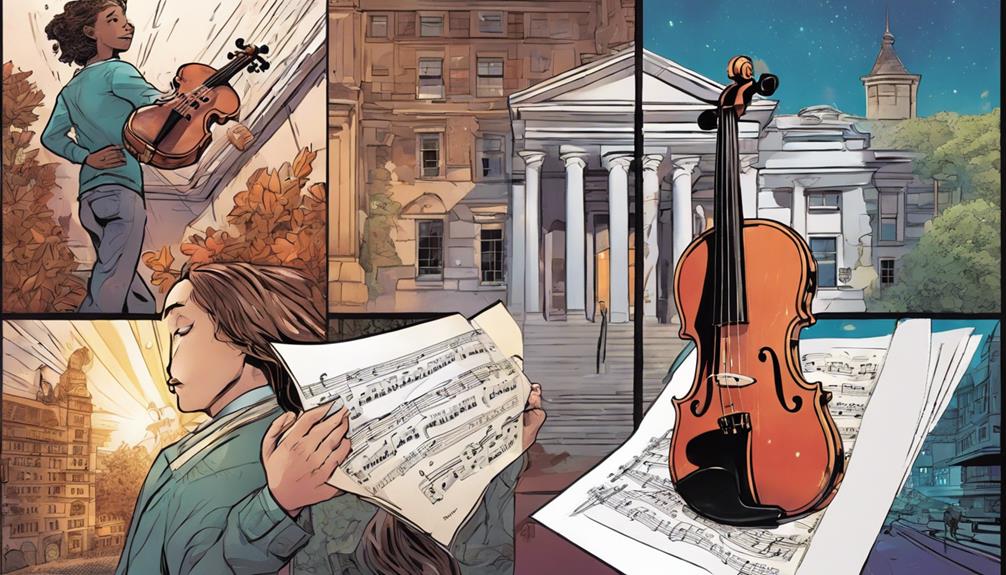
Increasing Your Chances
Selecting repertoire that showcases your strengths is a key strategy for increasing your chances of getting accepted into music school. By highlighting your abilities, you demonstrate to admission committees that you have what it takes to succeed in their program.
To further boost your chances, consider the following:
- Variety is key: Offering a range of repertoire choices can increase your acceptance chances by demonstrating your versatility and musicality.
- Stand out with unique pieces: Including lesser-played compositions can make a unique impact and set you apart from other applicants.
- Balance is essential: Make sure to balance your preparation on audition pieces with long-term projects to showcase your overall musicianship.
- Cast a wide net: Applying to multiple music programs can improve your acceptance options and provide a safety net in case your top choice doesn't work out.
Frequently Asked Questions
Is It Hard to Get Into Music School?
Yeah, it's tough to get into music school – acceptance rates are super low, and they're looking for exceptional talent, passion, and dedication. You'll need to bring your A-game to stand out from the crowd
How to Ace a College Audition?
To ace a college audition, focus on perfecting your audition pieces, showcasing your unique musicality and personality, and being prepared to talk about your musical experiences and goals.
How Hard Is It to Get Into the USC School of Music?
Imagine yourself as Emma, a talented violinist with a 3.8 GPA and a stellar audition performance. Now, here's the deal: with a 20% acceptance rate, getting into USC School of Music is tough, requiring exceptional musical skills, solid academics, and a compelling application.
How to Get Into Juilliard Music?
To get into Juilliard music, you'll need to showcase exceptional talent, dedication, and potential for growth through a rigorous audition, demonstrating technical proficiency, musicality, and individual artistry.
Conclusion
You've made it to the final note. The secrets to getting accepted into music school are now in your hands. By fine-tuning your musical talent, showcasing your personality, and highlighting your strengths, you'll be well on your way to standing out to admissions.
Remember, it's not just about the music – it's about presenting a well-rounded application that showcases your unique voice. Now, go out there and strike the right chord.

